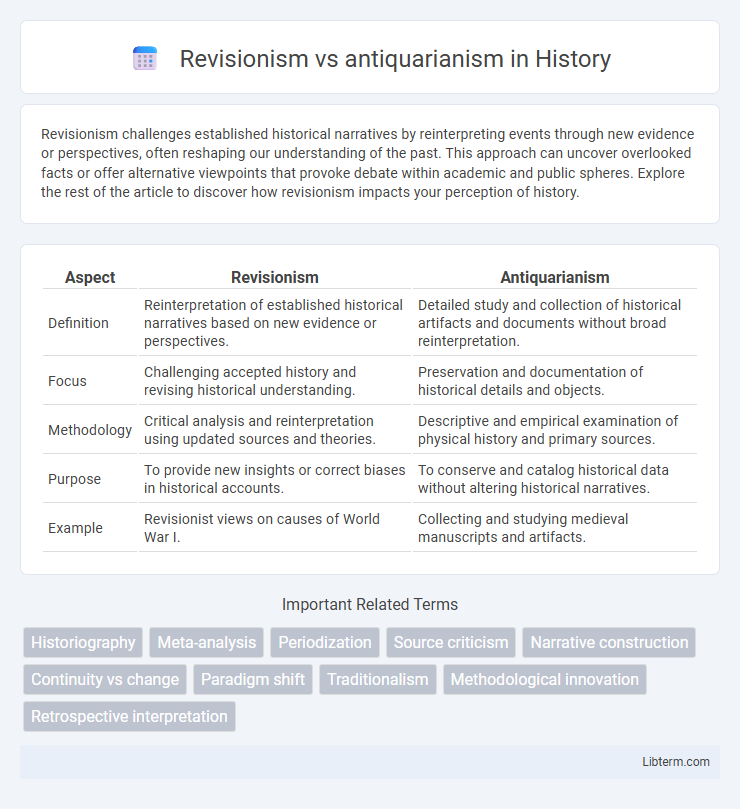Revisionism challenges established historical narratives by reinterpreting events through new evidence or perspectives, often reshaping our understanding of the past. This approach can uncover overlooked facts or offer alternative viewpoints that provoke debate within academic and public spheres. Explore the rest of the article to discover how revisionism impacts your perception of history.
Table of Comparison
| Aspect | Revisionism | Antiquarianism |
|---|---|---|
| Definition | Reinterpretation of established historical narratives based on new evidence or perspectives. | Detailed study and collection of historical artifacts and documents without broad reinterpretation. |
| Focus | Challenging accepted history and revising historical understanding. | Preservation and documentation of historical details and objects. |
| Methodology | Critical analysis and reinterpretation using updated sources and theories. | Descriptive and empirical examination of physical history and primary sources. |
| Purpose | To provide new insights or correct biases in historical accounts. | To conserve and catalog historical data without altering historical narratives. |
| Example | Revisionist views on causes of World War I. | Collecting and studying medieval manuscripts and artifacts. |
Understanding Revisionism: A Modern Historical Lens
Revisionism challenges traditional historical narratives by reinterpreting events through new evidence or perspectives, emphasizing critical analysis and context. It prioritizes dynamic understanding of history, adapting interpretations to contemporary values and methodologies. This modern historical lens contrasts with antiquarianism, which focuses on preserving and collecting facts without seeking reinterpretation or theoretical frameworks.
Antiquarianism Defined: Preserving the Past for Its Own Sake
Antiquarianism emphasizes the preservation and study of historical artifacts, documents, and sites for their intrinsic value rather than their role in broader historical narratives. This approach prioritizes detailed collection and conservation efforts to maintain cultural heritage without necessarily interpreting or re-evaluating historical events. Unlike revisionism, which seeks to reinterpret or challenge established historical accounts, antiquarianism focuses on safeguarding the past as a foundation for understanding history through tangible evidence.
Core Differences Between Revisionism and Antiquarianism
Revisionism critically reinterprets historical events to challenge established narratives, often incorporating new evidence or perspectives that reshape understanding. Antiquarianism emphasizes the collection and preservation of historical artifacts and detailed factual minutiae without seeking to revise broader historical contexts or theories. Core differences lie in revisionism's analytical reevaluation of history versus antiquarianism's focus on documentation and conservation of historical details.
The Motivations Behind Revisionist Historiography
Revisionist historiography emerges from a critical desire to challenge and reinterpret established historical narratives, often motivated by new evidence or shifting ideological perspectives. This approach seeks to correct myths, expose biases, and provide a more nuanced understanding of past events, contrasting with antiquarianism's focus on preserving and documenting historical artifacts and traditions without necessarily questioning their broader interpretations. The drive behind revisionism lies in addressing historical inaccuracies and promoting a dynamic dialogue that reflects contemporary values and knowledge.
The Role of Antiquarianism in Cultural Preservation
Antiquarianism plays a crucial role in cultural preservation by meticulously documenting artifacts, manuscripts, and historical sites, ensuring the survival of tangible heritage. Unlike revisionism, which often reinterprets historical narratives, antiquarianism prioritizes the careful collection and study of original objects to maintain authenticity. This practice supports cultural identity by safeguarding material evidence that forms the foundation of historical knowledge and collective memory.
Impact of Revisionism on National Narratives
Revisionism critically reinterprets established historical narratives, often challenging national myths and emphasizing marginalized perspectives, thereby reshaping collective memory and identity. It exposes biases and inaccuracies in traditional accounts, promoting a more inclusive and nuanced understanding of a nation's past. This process can provoke public debate, influence educational curricula, and alter the symbolic foundations of national pride and unity.
Antiquarianism and Its Influence on Museums and Archives
Antiquarianism, rooted in the systematic collection and study of historical artifacts, significantly shaped the development of museums and archives by emphasizing the preservation and cataloging of tangible cultural heritage. This approach fostered detailed documentation and conservation practices that laid the groundwork for modern archival standards and museology. The emphasis on primary sources and material culture in antiquarianism continues to influence how institutions curate exhibitions and manage archival collections to promote historical knowledge and public engagement.
Criticisms and Controversies: Revisionism vs. Antiquarianism
Revisionism faces criticisms for its tendency to reinterpret historical events with ideological bias, often challenging established narratives and provoking debates about factual accuracy and selective evidence. In contrast, antiquarianism is criticized for its narrow focus on collecting and preserving artifacts without adequately contextualizing them within broader historical frameworks, leading to fragmented or superficial understandings. The controversy between revisionism and antiquarianism centers on the tension between dynamic reinterpretation of history and static preservation of the past, raising questions about methodology, purpose, and the role of historians in shaping historical knowledge.
The Balance: Integrating Revisionist and Antiquarian Approaches
The balance between revisionism and antiquarianism lies in combining revisionist scholars' focus on reinterpretation and challenging established narratives with antiquarians' dedication to precise historical detail and preservation of primary sources. Integrating these approaches enhances historiography by ensuring that nuanced reinterpretations are grounded in rigorous evidence, promoting a comprehensive understanding of the past. This fusion supports critical analysis while maintaining accuracy, preventing distortions that arise from selective or superficial readings of historical records.
The Future of Historical Scholarship: Bridging Two Traditions
Revisionism challenges traditional narratives by critically reinterpreting historical events through rigorous analysis of new evidence, while antiquarianism prioritizes meticulous preservation and detailed study of artifacts and primary sources. The future of historical scholarship lies in integrating these approaches, combining revisionist frameworks with the empirical depth of antiquarian research to generate comprehensive and nuanced historical insights. This synergy enables historians to both question established paradigms and maintain fidelity to tangible historical records, fostering a more dynamic and evidence-based understanding of the past.
Revisionism Infographic

 libterm.com
libterm.com